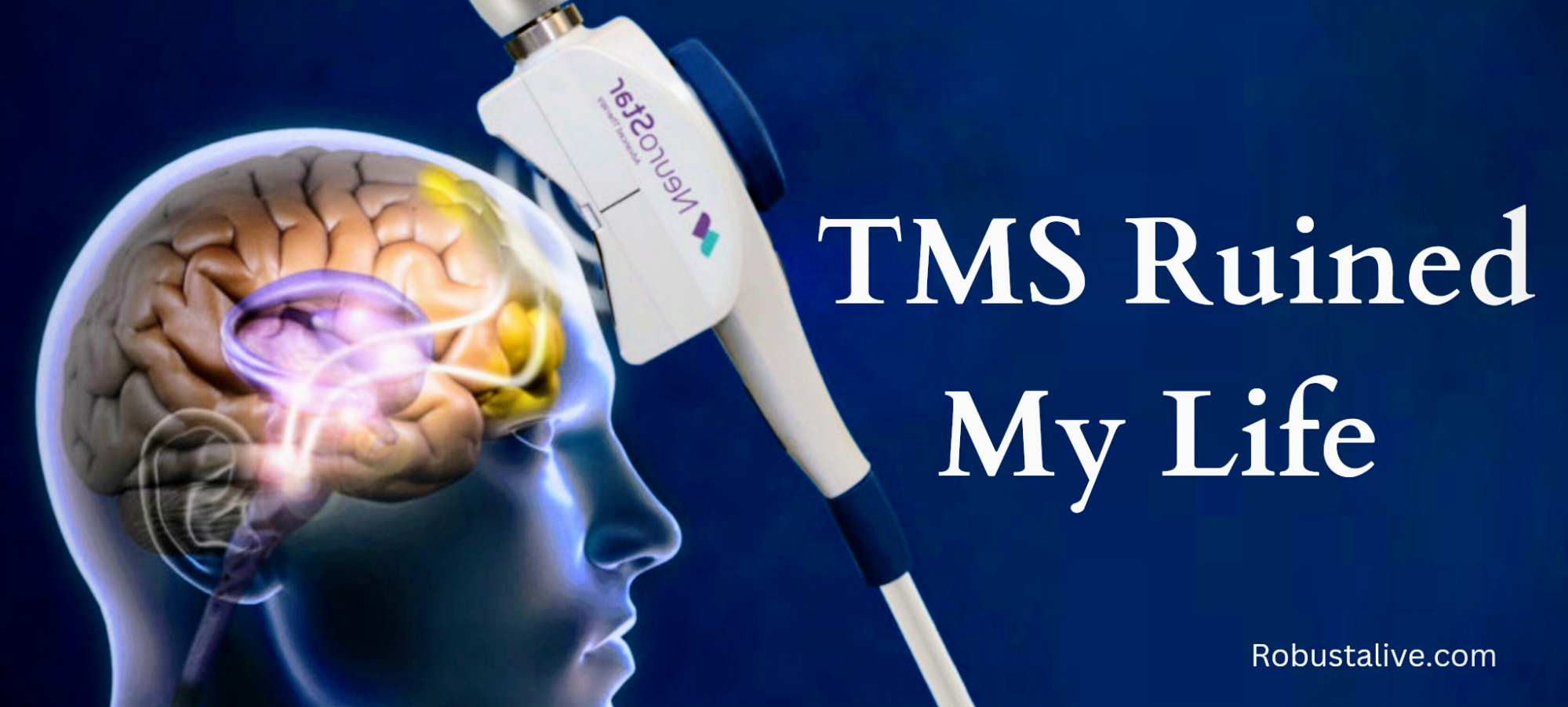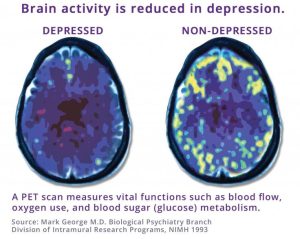TMS Ruined My Life

As you dive deeper into TMS treatments, you start hearing unsettling stories – tales of individuals who claim that TMS ruined their lives.
So, why are people saying that TMS ruined my life?
Online reviews reveal troubling experiences with TMS therapy, including worsening depression, discomfort during sessions, and adverse effects. Questions arise about its safety and effectiveness, especially for those with existing mental health conditions. Eye-related issues are a potential concern. Concerns also surround the influence of TMS manufacturers on studies.
In this article, we’ll delve into these stories, their implications, and the questions they raise about TMS therapy. Also, we will find out how you can minimize the adverse effects of TMS.
What Is TMS?
Transcranial Magnetic Stimulation (TMS) therapy is a non-invasive treatment that uses electromagnetic pulses to stimulate nerve cells in the brain. It is primarily employed for individuals with depression who have not responded to traditional treatments like antidepressant medications and psychotherapy.
The FDA approved TMS for depression treatment in 2008, affirming its effectiveness.
While most commonly associated with depression, TMS also shows promise in addressing other conditions such as anxiety and Parkinson’s disease.
Sometimes referred to as repetitive Transcranial Magnetic Stimulation (rTMS), it involves repetitive electrical impulses, often used interchangeably.

Source: NeuroStar
How TMS Works
TMS works by placing an electromagnetic coil against the scalp, delivering magnetic pulses to activate nerve cells in the brain.
For conditions like depression, TMS targets areas of the brain that have reduced activity during depressive episodes.
By stimulating these regions, TMS aims to alleviate depression symptoms and improve mood. There is also a variation called “deep TMS,” which uses a different type of coil to stimulate wider brain areas.
Why TMS Is Done
Usually, doctors recommend trying antidepressants and talk therapy first for depression.
- It offers hope to individuals who have not responded well to medications or psychotherapy. TMS is considered when other options have not yielded the desired results.
- It is also recommended for children and teenagers, as they may be more prone to experiencing adverse side effects from antidepressants.
Conditions TMS can help:
- Depression
- Obsessive-compulsive disorder (OCD)
- Anxiety
- Post-traumatic Stress Disorder (PTSD)
- Stroke rehabilitation
- Schizophrenia
- Parkinson’s disease
- Alzheimer’s disease
- Chronic pain
- Nicotine addiction
- Multiple sclerosis
TMS Ruined My Life: Negative Reviews Online Express Troubling Experience
TMS was once presented as a beacon of hope for those grappling with depression, anxiety, and various mental health challenges. Its non-invasive promise and seemingly minimal side effects drew many like a moth to a flame.
However, some stories have emerged from TMS treatments that reveal a darker side, leaving individuals in despair.
Angela’s Descent: From Hope to Hopelessness
Angela, managing her anxiety, OCPD, depression, and childhood PTSD with remarkable resilience, ventured into TMS therapy as a potential lifeline. Initially, she found fleeting relief, but it was short-lived. The treatment interruption due to insurance delays worsened her depression and anxiety.
Angela’s condition spiraled downward, and even after resuming TMS, she continued to deteriorate. Her life had taken a bleak turn, her energy depleted, and suicide ideation became overwhelming.
The Disconcerting Revelation: Worsening Depression
What’s most alarming is that Angela’s psychiatrist mentioned a disheartening trend – many undergoing TMS seemed to experience a deterioration of their depression.
This revelation raises questions about the effectiveness and safety of TMS, particularly for individuals with pre-existing mental health conditions.
Treatment Session Ordeal
Anonymous accounts of TMS treatment sessions paint a troubling picture. The sensations described during sessions are far from the rosy picture painted by the marketing.
Discomfort, weird sensations, and concerns about the intensity of the pulses raise red flags. The promise of convenience crumbles as the harsh reality sets in.
When Hope Turns to Despair: Larisa’s Story
Larisa’s encounter with TMS, despite her bipolar diagnosis, led to a manic episode and reckless spending. Disturbingly, she claimed to have been treated like a guinea pig, and her pleas for help went unanswered.
Her life spiraled into chaos, and she was on the brink of homelessness.
Usman’s Struggle: A Life Altered By TMS
Usman’s TMS journey began with hope but led to turmoil. Initially, promising treatment triggered a manic episode, insomnia, and many troubling symptoms.
Seeking answers, Usman’s life took an unexpected turn, and he yearned for a return to normalcy after over a year of enduring these adverse effects. TMS, once a potential lifeline, became an unforeseen hardship.
Adverse Effects: A Growing List
Reports of adverse effects linked to TMS on the internet are on the rise. These include dissociation, depersonalization, odd head sensations, heightened anxiety, insomnia, light sensitivity, decreased enjoyment of life, vertigo, and distorted depth perception. These symptoms leave individuals questioning the actual cost of TMS on their mental well-being.
The Shadowy Influence of Manufacturers
Another unsettling aspect is the apparent influence of TMS manufacturers on studies, practices, and patients.
The marketing machinery behind TMS paints it as a risk-free panacea for mental health issues, but the reality seems far murkier. Questions arise about the objectivity of studies funded by these manufacturers.
The Ophthalmic Conundrum
Intriguingly, reports link TMS to eye-related issues, including retinal tears and posterior vitreous detachment. While it’s hard to establish causation, the temporal association is concerning.
The Unanswered Questions
As these stories on how TMS ruined my life unfold, crucial questions remain unanswered. Is TMS truly the safe and effective solution it’s touted to be? Are the risks, particularly for those with underlying mental health conditions, being adequately disclosed? What can address the suffering of those who feel that TMS has ruined their lives?
These accounts serve as stark reminders that while TMS may offer hope to some, its impact on individuals can be far from the promised salvation.
Awareness, caution, and informed decision-making are crucial when navigating the complex landscape of mental health treatments.
TMS Ruined My Life: The Downsides
The downsides of TMS treatment are given below:
- Limited Effectiveness: Some people do not respond to TMS therapy, which does not work for everyone. Those who put time and money into it may find this lack of response disheartening.
- Insurance Challenges: Patients often face difficulties with insurance authorization. While most significant carriers cover TMS, patients must demonstrate that previous therapies and medication trials have been ineffective before getting approval. This process can be time-consuming and frustrating.
- Financial Burden: Even with insurance approval, TMS can be expensive. Many patients must pay out-of-pocket for at least a portion of their treatment, and Medicaid does not cover TMS in certain regions, like Colorado.
- Time-Consuming: TMS treatment demands a significant time commitment. Patients often find it challenging to accommodate clinic visits five days a week for six weeks, especially when they have busy schedules.
- Minor Side Effects: Although generally mild, side effects of the treatment may include localized pain, discomfort, and facial twitching. It is worth noting that approximately 30% of patients might experience headaches during or after the procedure.
- Rare but Serious Side Effects: In exceedingly rare cases (about six out of 10,000 patients), seizures can occur. Factors like a history of seizures or a brain tumor increase the risk of this severe side effect.
- Not Suitable for Bipolar Disorder: TMS is not recommended for individuals with bipolar disorder due to evidence suggesting it can trigger hypomania or mania.
- Varied Efficacy: Patient experiences with TMS can vary widely. Some, like Jamie, may not find it incredibly effective and may experience only marginal improvement in their depressive symptoms.
- Temporary Relief: Even when TMS provides relief, it is often temporary, lasting for three to six months. Insurance may not cover repeated treatments until a specific time has passed.
- Mild Hearing Impairment: TMS can cause short-term hearing impairment, usually preventable with proper earplug use.
What Is The Dip In TMS Therapy?
The “TMS dip” is a temporary worsening of depression or anxiety symptoms that can occur during TMS therapy. Its exact cause is not fully understood but may be related to initial disruptions in neural pathways or individual brain chemistry differences.
Notably, the dip doesn’t mean your condition worsens, and it often precedes noticeable improvement as treatment progresses.
Who Should Avoid TMS?
Avoid TMS therapy if you have:
- Metal in your head, including deep brain stimulators, electrodes, neck or brain stents, aneurysm clips or coils, shrapnel or bullet pieces, facial tattoos with metallic ink, metal plates, cochlear implants, or permanent piercings.
- History of epilepsy or seizures.
- Currently taking stimulant medications.
- Medical conditions that heighten the risk of seizures.
How to Minimize the Side Effects of TMS Therapy
To make your TMS experience as smooth as possible, consider these practical strategies:
Step 1: Comprehensive Pre-Treatment Assessment
- Provide a detailed account of your symptoms to customize the treatment for your needs.
- Share how long you’ve been experiencing these symptoms, helping to gauge the condition’s severity.
- Disclose your medical history, including past surgeries, medications, and your family’s health background.
- Tell your provider about any implants or devices within your body that might interact with TMS.
- Be honest about your headache frequency, seizure history, or prior brain injuries.
- Mention any other medical conditions, diagnosed or suspected, to give a complete health picture.
Step 2: Ask Informed Questions
- Gain insight into why patients opt for TMS therapy and what drives this choice.
- Discuss potential safety concerns associated with TMS to clear any doubts.
- Inquire about the flexibility to pause or adjust the treatment if you ever feel uncomfortable.
- Seek explanations for any worries you’ve come across online regarding TMS.
- Understand how your medical history could influence potential side effects.
- Get clarification on temporary symptom worsening during the treatment.
- Express your concerns or fears to ensure they’re addressed adequately.
Step 3: Evaluate Negative Reviews and Public Opinion
- When assessing negative reviews, consider the clinic’s quality; experiences can vary widely between providers.
- Examine the treatment’s success rates, which offer insights into its effectiveness.
- Remember that while negative experiences can happen, they’re typically minimized through proper training and medical supervision in a controlled setting.
Following these steps and maintaining open communication with your healthcare provider can reduce the risk of side effects and improve your overall TMS therapy journey.
FAQs
Can TMS Cause Brain Damage?
TMS (Transcranial Magnetic Stimulation) is generally considered safe and does not cause brain damage.
Can TMS Make My Anxiety Worse?
Yes, TMS can potentially increase anxiety levels in some individuals, often due to the fear of the treatment or increased brain activity. However, its impact on anxiety varies from person to person, and it’s crucial to communicate any changes in anxiety with your doctor during TMS treatment.
Is TMS Just A Placebo?
TMS is not merely a placebo, though. TMS is a legitimate therapy that has a long history and has undergone significant research in clinical trials. Its therapeutic effects are not simply attributable to the placebo effect.
Can TMS Therapy Change My personality?
No, TMS therapy will not change your core personality traits or values. Any perceived changes are often related to mood and symptom management improvements, not alterations in your fundamental personality.
Conclusion
In the complex landscape of TMS therapy, peoples’ experiences saying TMS ruined my life, and unanswered questions highlight the need for awareness and informed decisions. While TMS offers hope to some, its impact remains uncertain for many.
Awareness, caution, and informed decisions are vital when considering TMS as a mental health treatment. It’s a reminder that one size doesn’t fit all in mental health care.





